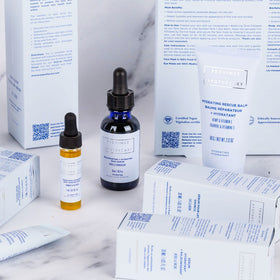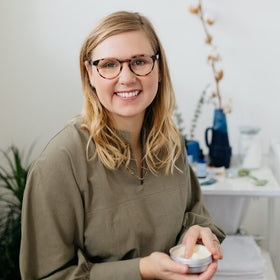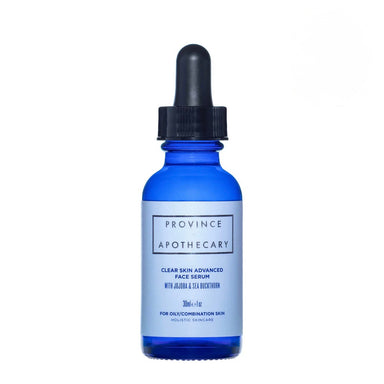Adult Onset Acne | Why It Happens And What We Can Do About It

Adult acne has become an increasing problem for many women in their late 20s, 30s, and even 40s. What is often thought of as a teenage problem can carry on into later years, especially for women. As a clinician, I see lots of women in their late 30s who never had skin concerns in the past but are now experiencing acne for the first time.
So why is this happening?
Acne can happen for many reasons. Many of the most common reasons for adult acne are related to hormones. When levels of one hormone are higher than others and out of balance, this leads to acne, especially cystic acne.
Women will naturally experience hormonal changes during ovulation, pregnancy, perimenopause, and menopause, but there are also other factors that can affect your body’s hormone levels.
What Can I Do About It?
While there are some steps you can take to balance your hormones, I always recommend talking to your Naturopath about safely and effectively targeting your body's needs. You can book an appointment with me at our Toronto skincare clinic HERE
Causes of Hormone Imbalances
The Pill
The birth control pill can cause fluctuations, especially when a woman stops taking them after long periods of time. The birth control pill is designed to give you a specific dosage of hormones on a daily basis to prevent ovulation. This means that for 21 days out of each month your hormones remain steady: progesterone and estrogen stay high and don’t cycle up and down like they would normally. This can help prevent the ovulatory and menstrual fluctuations that cause disruptions in our skin (acne during ovulation or menses).
When we stop taking the pill, the body’s hormones are lower than when you were on it, creating a higher ratio of androgens (testosterone) to estrogen and progesterone, until your body’s regular hormone production gets back on track.
Androgens are responsible for many things, including the stimulation of oil glands and hair follicles of the skin, and an excess of them can cause an overproduction of oil and inflammation around the hair follicle.
Higher levels of testosterone relative to the other hormones caused by stopping the pill can cause deep cystic-type acne, especially on the lower jaw and chin.
Stress
When we experience stress, our body will produce more cortisol. This overproduction of cortisol lowers the production of estrogen and progesterone, and causes an increase in androgens (testosterone), leading to cystic-acne.
Synthetic Chemicals
Check your labels carefully for chemicals that are known to disrupt hormones. Many moisturizers, lipsticks, sunscreens, nail polishes, and mascara brands contain parabens and other chemicals that disrupt hormone production. When your hormones are already fluctuating, this extra disruption from chemical ingredients can cause a dramatic shift in skin texture and health. For more information on this, check the Environmental Working Group www.ewg.org and look up your products to determine overall toxicity levels.
PCOS
Polycystic Ovarian Syndrome can cause acne due to higher levels of testosterone in the body. Other symptoms include weight gain, cysts on the ovary leading to changes in menstrual cycles, and increased hair growth on the chin, abdomen, and nipples.
Other causes of adult acne
Medications
Prescription medications such as steroids, lithium, and anti-epileptic drugs are common causes of acne in adults.
Digestion
Increased bowel transit time caused by constipation can lead to hormonal recycling in the body, a common cause of acne in adults. Rather than being expelled from the body, excess hormones are held in the body and re-absorbed. When they are re-absorbed, they are converted into alternate forms that can be more harmful. To prevent this, increase water and fibre in your diet to reduce constipation and allow for proper hormonal elimination.
Genetics
Some women are genetically predisposed to acne based on a family history. If there are a few people with acne in your family, you may be naturally at an increased risk of adult acne.
Vitamins + Food
- Vitamin A – when low or deficient, skin becomes dry, nails become brittle and hair can break. This nutrient is stored in the liver and found in in the skin (especially the sebaceous glands). The body needs to ingest fat in order to properly absorb Vitamin A from the diet, so adults on low-fat diets will often experience lower levels of vitamin A and D and therefore an increase in acne and dry skin.
- Vitamin D – important for skin health and hormonal regulation as it affects the endocrine system. Most Canadians are low in Vitamin D, as it is mainly absorbed through the skin when exposed to sunlight. When taken internally, it can only be absorbed when ingested with fat, like Vitamin A. Vitamin D influences skin hydration and the formation of new skin cells.
- Vitamin E – another fat-soluble vitamin essential for oil production, tissue healing and proper scar tissue formation. Vitamin E is important to apply topically to skin as well as ingested as part of your regular diet.
- Essential Fatty Acids Omega 3 and 6 – EFA’s not naturally produced in the body are very important for the anti inflammatory processes in the body and skin. When looking at the sebum produced in people with acne, we see that it is often deficient in omega-3 fatty acids. Studies also show that a diet high in omega-6s has been associated with inflammatory acne in teens and adults.
-
Sugar – highly refined carbohydrates are associated with longer-lasting acne than diets with low glycemic index (low sugar content). Adults who are under increased stress will crave sugar products more frequently. Stress activates a hormone called cortisol, which will release sugar from its storage spots in the body and will also cause you to crave easily digested sugars like simple carbohydrates. This is a survival mechanism so that we can use the sugar quickly and escape whatever stressful situation we are in (ex: attack from a wild animal)
- Dairy - milk products come from pregnant cows exposed to a lot of hormones are known to contribute to acne in humans by throwing off our natural hormone balance. When experiencing acne, it is best to reduce exposure by choosing dairy alternatives.
Skincare Routine
A lot of soap based cleansers will dry out the skin, making skin vulnerable to damage, therefore allowing for bacteria to enter the skin at a deeper level.
Our Suggested Skincare Regime For Adult Acne
Adult acne is different from the acne you had as a teen, and your products should reflect this. Mature skin is thinner and more delicate, so it’s important to avoid over-drying and causing more inflammation. Gentle products that keep skin balanced and work to fade scarring and damage are best.
Moisturizing Oil Cleanser + Make Up Remover
Our oil cleanser is essential for everyday cleansing. Use daily to thoroughly remove dirt, make-up and pollution without disrupting the natural pH of your skin. The blend of pure plant oils won’t clog pores, dry out skin or cause irritation.
Invigorating + Balancing Toner
Not your average toner, our cooling floral essence-based toner feeds your skin nourishing botanicals and re-balances after cleansing. The alcohol-free formula hydrates and smoothes skin, controls the appearance of oil, and enhances the absorption and performance of oil serums for brighter, firmer skin.
Clear Skin Advanced Face Serum
If your skin is on the oily-side, our advanced formulation of plant-powered oils soothes skin’s appearance for a brighter, more even tone. It balances and tones, working to control the appearance of oil while providing hydration and protection from the elements. Perfect for sensitive and problem skin, it restores skin’s health and leaves you with a truly radiant complexion. If you have dry, acne-prone skin, we suggest layering this serum with moisturizer or face balm.
Clear Skin Advanced Spot Concentrate
Use this to target breakouts, including cystic blemishes that begin under the skin. Our concentrated blend of superior botanicals purifies acne-prone skin without harsh, drying or irritating ingredients, improving surface texture for clearer-looking skin. One drop is all you need to rejuvenate your skin!





